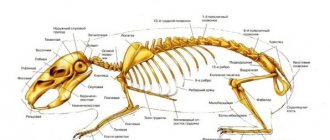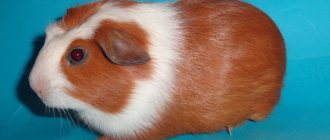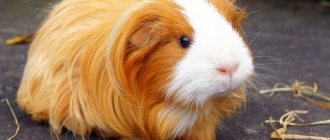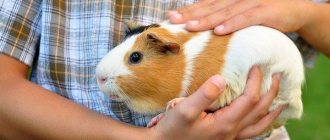Guinea pigs are far from silent creatures. They are very contactable and emotional. This is their special charm. They know how to convey emotions with a palette of melodic sounds. Over time, owners will be able to recognize the pig's tongue, but it is better to learn to understand the meaning of sounds as quickly as possible. Then it’s easier to make friends, and you can rest assured that your pet’s wishes are correctly understood.
Hums
Rumbling sounds can have a variety of meanings, depending on the position you are currently occupying. If the pig is currently feeling content and happy, then it will emit a guttural rumbling against the background of absolute relaxation and ease. However, if the rumbling sounds have a higher pitch, then the animal is most likely irritated by something. Tension in movements will also indicate this. If you take a closer look at the pet, you can see that it trembles while purring. But abrupt rumbling sounds clearly indicate that your pig is scared or feels uncomfortable.
Cute chirping, tweeting
It's not often that you hear a guinea pig making strange sounds that sound like birds chirping. Psychologically, from the outside, this can be compared to when a person sings in the shower. This behavior continues for no more than half an hour. Animals in the process of tweeting do not notice anyone around.
Chirping can be triggered by a state of strong excitement or emotional stress. For example, after a quarrel with cagemates.
The females chirp with the knowledge that she will soon have cubs and is happy to announce it. The male can thus invite the female to mate. When guinea pigs talk by chirping, there is no cause for concern.
Squeals or whines
A squeal is a high-pitched squeak that unmistakably signals that your pet is feeling unwell and is overcome by fear and pain. If you hear this sound, be sure to check on your pets to make sure they are okay and no one was hurt. By whining or moaning, guinea pigs want to tell their owners about their irritation or dislike for something or someone, for example, their brothers.
Squeaks: all emotions in one sound
The squeak of a guinea pig has the largest range of values.
The reasons why your pet squeaks may be as follows:
- The animal was scared. In this case, the squeak is an involuntary reaction of the animal caused by fear.
- Newborn cubs squeak, expressing concern that they want to convey to their mother.
- Squeaking is chosen as a method of communication by males during the courtship period.
- If the animal is in pain, it squeaks.
- If there is an owner nearby who does not pay attention to the pet, the animal squeaks to evoke pity.
- Squeaking can mean indignation and protest. Animals love to spend time on their owner's lap. If you put them in a cage, they will squeak and be indignant that they were deprived of pleasure.
- Squeaking can mean a desire to get something. For example, when the owners sit down at the table and feed the pet at the same time. One day they won't do this, and he will squeak, begging.
- The pet may squeal with joy when it sees its owner entering the room. This expresses joy.
- A thin, plaintive squeak indicates that he would like to refresh himself.
Don't ignore the sounds of guinea pigs. The animal no longer has the opportunity to communicate its feelings.
Language of the body
Guinea pigs can also communicate through body language. If you understand this language, you will receive the keys to understanding what is happening to your pet.
When juveniles are particularly happy, excited, or in a playful mood, they like to jump up and down. Although this behavior is also typical for older representatives of the species. However, they don't jump that high.
Numbness often occurs at a moment of great surprise or doubt about something. Then she will stand still.
Sniffing is a way for guinea pigs to assess what is happening around them. In addition, this is how they recognize each other by sniffing the area around the nose, chin, ears or backside. And if they want to greet their brother in a friendly way, then they touch each other’s noses.
Showing aggression, a guinea pig tries to rise above its opponent, raising its head and standing on stiff legs. In addition, they sway menacingly from side to side, their fur stands up, and their mouth distorts into a grin. To enhance the effect, rodents can also hiss and grind their teeth. If you notice this behavior in your pets, be on the lookout. You may have to intervene in their relationship to prevent a fight.
If an animal swaggers, sways from side to side on stiff legs, and even grinds its teeth, this may be a sign of aggression. Although during the mating season, pompous behavior towards an individual of the opposite sex is an element of courtship.
Guinea pigs love to mark their territory. To do this, they rub their chin, neck or backside against the objects they want to get.
The desire to rise up manifests itself either during sexual relations between males and females, or at the moment of the formation of a hierarchy within the social structure of guinea pigs when kept in groups.
If your guinea pig is handled, it may show signs of anxiety and agitation. This may indicate that she wants to go to the toilet or that she is simply tired of playing with you. Be that as it may, you should return your pet, at least for a while, back to the cage.
Throwing back the head can be observed in spoiled guinea pigs at the moment of irritation. This way they can ask their owner to stop.
If a rodent begins to lick its owner, many consider this a sign of love. Maybe that's true, or maybe they just like the taste of salt on your skin.
They also love to be picked up by their owner out of their cage. Although at first the pigs show timidity, this is not at all because they do not want to play with the owner, but because a natural defense mechanism is manifested in them. It won't be long before she wants to cuddle up to you.
Article on the topic: A complete guide to the care and maintenance of a guinea pig
Grinding or chattering of teeth
When your guinea pig chatters its teeth, you need to be wary. This extreme degree of anger, which does not happen often. Often guinea pigs make sounds similar to hissing, chattering their teeth and showing a grin. This means the animal is aggressive. And there are good reasons for this.
A fight is inevitable if you do not react in time and do not seat the animals. At the same time, it is necessary to remove a less aggressive animal so as not to turn out to be “extreme”.
Why can rodents quarrel? More often this is a division of territory. To avoid such disagreements, you need to install a very large cage to house two or more animals. Animals are accustomed to being neighbors in stages. It is possible that, like people, they may exhibit psychological incompatibility due to their diametrically opposite character.
To begin with, they place the cages close to each other, but so that the voice of the guinea pig can be heard by the future neighbor. After one or two weeks they can be placed side by side. And only in ten days will they be given the opportunity to share one place of residence.
If conflicts are excluded and no other external irritants can be detected, the animal should be shown to a veterinarian. This may be deviations in the functioning of the gastrointestinal tract, the growth of teeth that were not sharpened in time.
Expressing interest or pleasure
Guinea pigs are distinguished by their emotionality and its manifestations. Have you noticed that the animal is quietly squealing or whistling gently? Rest assured: the pet is satisfied with its life .
Rumbling, accompanied by vibration, signals the rodent's calmness and satiety; it often occurs when petting the animal. This means he is happy.
Snorting also reflects a similar emotion. This sound can also indicate interest. A guinea pig making these sounds will be intently watching something or working hard on something.
Listen to an example of such sounds to better understand your pet.
How to understand what your pet wants?
Squeaking is a way of communicating with relatives and humans. Guinea pigs have a wide range of sounds, each of which means something. Over time, every owner of a pet rodent begins and must learn to understand the language of a small pet. Let's try to understand some of them.
- A persistent, incessant squeak at intervals of one or two seconds indicates the pet’s obvious hunger.
- Compassionate - speaks of fear or fear in cubs. Older pigs that are kept alone are trying to attract attention and have some fun.
- The cooing is somewhat reminiscent of the clucking of a hen - the pig is well-fed, happy with life and is in a great mood - for her at this moment the world is beautiful and impeccable.
- “Grunting” is an expression of friendliness when meeting other relatives. The same sound can mean that the pig is busy with something very exciting.
- Growling - this basically indicates the pet’s fear of an opponent who is stronger than him. By the way, this opponent can also be a person - that’s why a guinea pig squeaks when you pet it. Having heard a menacing, or rather frightened roar, accompanied by the clicking of teeth, it is better to leave the pet alone before he uses his sharp teeth;
- The rattling purr indicates mating games - this is how the male attracts the attention of the lady of his heart and courts her. If suddenly the female has no desire to communicate with the opposite sex or she is not ready for mating, then in response she will begin to bare her teeth and growl.
- A piercing loud sound that you wouldn’t expect to hear from such a small creature, more like a groan, a way of talking about pain. You cannot ignore such a squeak, otherwise you may pay with the life or health of the baby.
Guinea pigs are interesting and even mysterious creatures that give the joy of communication to their owners. By learning to understand and feel furry rodents, you can always achieve perfect harmony in the relationship between pet and person.
Sniffles/wheezes/whistles
A satisfied pet often sniffles, and a well-fed pet whistles. While waiting for a treat, the animal may begin to sniffle and gradually switch to whistling. This situation can occur when opening the refrigerator.
If the owner does not get a treat, the pet can also whistle to attract attention to his person and get something tasty.
A prolonged whistle or a whistle repeated after a few seconds by animals can serve as a greeting or signal that they are hungry.
If your guinea pig wheezes when he breathes, he needs to be seen by a veterinarian.
Negative signals
A frightened guinea pig will say a dull “Urrrr”, similar to a vibrating alert on a phone, and will tremble slightly. But she indicates irritation with a short sharp squeal - for example, when you carelessly touched her. If the pig is angry, it squeals for a longer time, while clicking its teeth, as if warning: “I’m not in the mood for jokes!”
One of the most impressive sounds a pig makes can be heard at night. This is a very sharp intermittent squeak, similar to the cry of a bird caught in a snare. At the same time, the pig freezes in place, her gaze glazes over. An inexperienced owner may be afraid for his pet. This sound is used by pigs to call their relatives. Little pig babies can express their fear this way.
Since guinea pigs are herd animals, they find it sad to live alone. If your pig makes this noise frequently, try petting your pig more often or give him a buddy in his cage.
If the pig is hungry, you won't miss it. She will stand up and scream shrilly throughout the apartment: “Wee-wee-wee!”, moving her ears. It’s amazing how loud such a small animal can be! Guinea pigs study their owners. They usually remember sounds, such as the sound of a knife hitting a cutting board when preparing a salad or the rustle of a bag from which cabbage is taken out. Subsequently, upon hearing these sounds, the pigs whistle invitingly. They also have a well-developed sense of smell. So you’re unlikely to be able to quietly snack on a cucumber; the alarm will immediately go off!
When should you be wary?
So, the same sound can mean both good and bad emotions; you need to delve into the context of what was “said.” Look at the environment, at the events that preceded the sound.
List of sounds that you should be wary of when you hear them:
- The animal squeaks shrilly. If no external irritants are found that need to be eliminated, the animal should be taken straight to the veterinarian.
- Grinding of teeth almost always means problems with chewing function. It is necessary to examine the animal's teeth. An infection can settle there. Only a veterinarian can see this.
- The loud cry of a rodent means that the animal is scared and in danger. Stress factors for the pig must be eliminated, otherwise it can become seriously ill.
- Wheezing when breathing is also a reason for urgent medical attention.
Each animal can bring personality and express special emotional notes. The squeak of a guinea pig is an expression of a palette of feelings. Recognizing them is a difficult but interesting task.
Why does my pet whistle?
Often, when returning home, owners notice that their pet has risen on its hind legs and is whistling loudly. This is how the animal shows that it missed its owner and is glad to see him. Rodents also whistle when it's time for a snack. A hungry pig whistles when it sees a treat in its owner's hand or when it notices that the feeder is already empty. Owners who are annoyed by the constant whistling of a rodent are advised to put more food in the feeder so that the pet remains full longer and does not require supplements.
Guinea pig sounds and their meaning
Guinea pigs are highly social animals that exhibit a wide range of behaviors. These small animals only seem quiet and inconspicuous in appearance, but just try not to feed this “quiet” creature on time, and you will immediately hear who is boss and where the crayfish spend the winter!
Guinea pigs are active, inquisitive and very talkative animals. Every sound a pig makes has a meaning, so knowing the meaning of all your pig's "pew-pew" and "wee-wee" sounds will help you understand your little friend better.
You can tell when your pet is happy, sad, excited or scared.
The sounds of guinea pigs cannot always be interpreted with 100% accuracy, since each pig has individual characteristics. For example, some pigs may show happiness by purring, while other pigs' purring may indicate anger or displeasure.
Generally speaking, it is much easier to classify guinea pig sounds into two categories - positive sounds and negative, alarming sounds . The most common sounds in both categories are listed below. We hope these examples will help you understand the piggy language. Well, or at least understand the basics of spoken pig speech.
Anxiety, fear and aggression
A short, high-pitched “brrr” will indicate that your pet is irritated or frightened. This is how the animal will react to loud voices and sounds that appear unexpectedly. If your pet whines or moans, then he is irritated . Also, the rodent is not happy with its fellow who is nearby. You will know about fear or an incipient fight when you hear teeth clicking and tapping. The pig is hostile and ready to attack. This situation occurs when two males are nearby.
Teeth chattering also symbolizes anger and dissatisfaction. It is worth eliminating the object or subject of aggression so that the rodent does not become nervous. Hissing has a similar interpretation.
When communicating
If an animal grunts when surrounded by its own kind, then in this way it greets its relatives and shows a friendly attitude. Purring or rumbling is a sign of sympathy that an animal experiences when being near its owner or another pet. The guinea pig is an extremely friendly and sociable animal. Therefore, she manages to experience loneliness extremely poorly.
Don't be alarmed if you hear a loud squeal when you get home.
This is how the pet conveys the joy of the owner’s arrival and invites them to chat soon.











